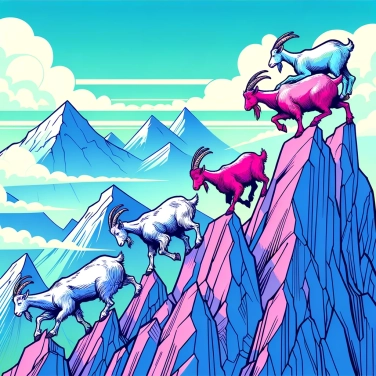Goats are able to climb easily in steep mountains thanks to their adhesive hooves that allow them to grip onto rocky slopes and their natural agility to move on difficult terrain.

Goats have special hooves that are super well adapted for scrambling on very steep rocky surfaces. Their hooves are divided into two distinct parts (bipartite hooves) that easily spread apart to provide excellent grip on irregular surfaces. Each half is made of a hard outer layer of keratin, which is highly resistant, and a central fleshy pad that acts like a non-slip sole, offering maximum traction on slippery or steep ground. The hard outer edge clings to the roughness of the rocks, while the soft inner pad provides stability and balance, allowing them to stroll comfortably where you would struggle to stand. In short, it’s a truly integrated climbing gear!
Goats have a compact body with a low center of gravity located close to their legs, which provides them with extraordinary stability on steep rocks. Their narrow chest and muscular torso facilitate precise balance, even on tiny surfaces. This conformation allows for smooth and fluid movements rather than awkward or abrupt ones. These animals can thus keep their weight directly above their hooves, significantly reducing the risk of falling during precarious movements.
With specially developed musculature, goats possess remarkable agility that allows them to leap efficiently and lightly onto narrow ledges. Their quick reflexes help them react instantly to stones or slippery surfaces, thus limiting dangerous falls. They can adjust their position precisely during jumps thanks to finely coordinated legs and excellent distance estimation. This ultra-fast reaction ability and their exceptional skill make them outstanding climbers, comfortable even on the most delicate steep walls.
Goats have laterally placed eyes, which give them a wide panoramic vision. They easily capture details around them without constantly having to turn their heads. To navigate difficult terrain, they also rely on an excellent spatial memory: once they have identified a safe route, they instinctively store it in their memory to reuse it without hesitation. It's as if they memorize a natural 3D map, allowing them to easily find those narrow and steep passages. Thanks to this dual ability—broad vision and precise recall—they move effortlessly and confidently over rocks and cliffs that seem impassable for many other animals.
Goats have a highly developed natural instinct for moving intelligently in a rugged environment. They generally prefer to follow familiar paths that they have already tested and memorized: they know every rock, every crevice, and know exactly where to place their hooves. When faced with new terrain, they are cautious and take the time to assess the passage, always choosing the safest and least risky route. Additionally, they often move in groups, which allows them to learn by observing their more experienced peers: observing and copying are among the essential keys to their success in these rugged areas.
In Morocco, goats sometimes climb argan trees to feed on their leaves and fruits, thereby illustrating a remarkable adaptability that goes beyond even the steep mountains.
Goats have horizontal rectangular pupils, which allows them to have a very wide panoramic vision to better spot predators in uneven terrain.
A mountain goat can jump up to 3.5 meters in a single leap, making it particularly agile and capable of easily transitioning from one rocky surface to another.
The structure of goat hooves consists of two completely independent flexible digits, allowing them to grasp and maintain their balance even on extremely narrow and uneven surfaces.
Yes, the ability to climb in rugged habitats is a major advantage against predators, as few of them can follow goats in these difficult terrains, providing a true natural sanctuary for protection.
Although most goats are naturally skilled at climbing, certain species—such as ibexes or Rocky Mountain goats—have even more pronounced adaptations, allowing them to effortlessly conquer even the steepest terrains.
Goats generally do not fear heights, as their climbing instinct and excellent panoramic vision protect them from vertigo. These characteristics allow them to navigate calmly even on impressive terrains.
Other animals such as ibex, chamois, mouflons, and some felines like snow leopards are also very skilled at navigating rugged terrains due to specific anatomical and behavioral adaptations.
Goats have special hooves with two flexible parts that adjust to the terrain, providing excellent grip. Coupled with an ideally positioned center of gravity and great agility, this allows them to easily climb extremely steep walls without the risk of falling.

100% of respondents passed this quiz completely!
Question 1/5